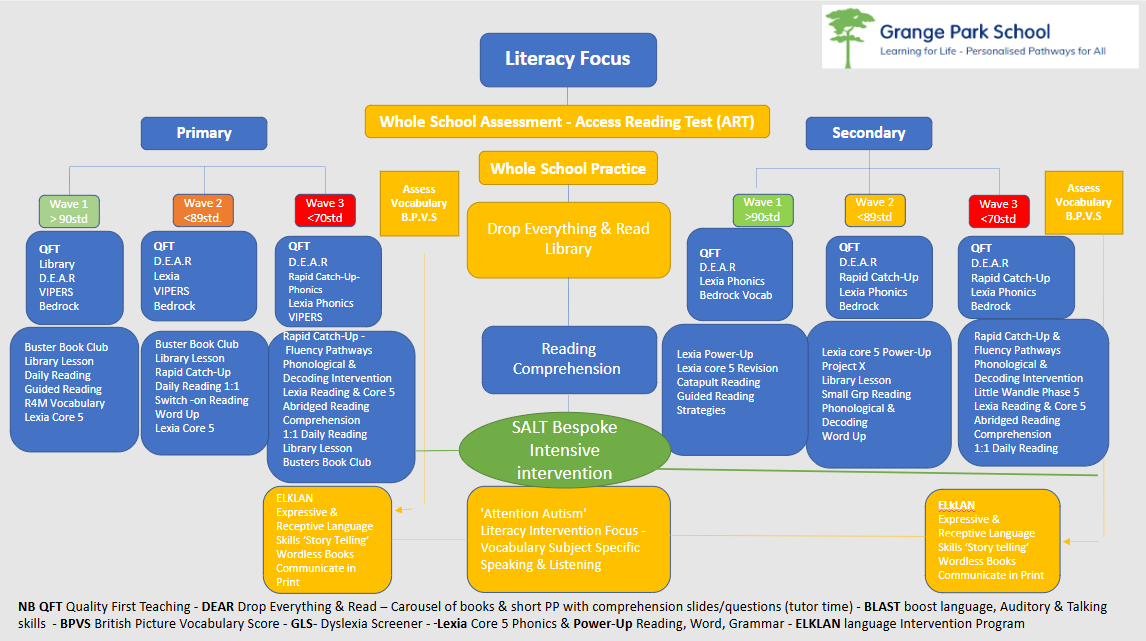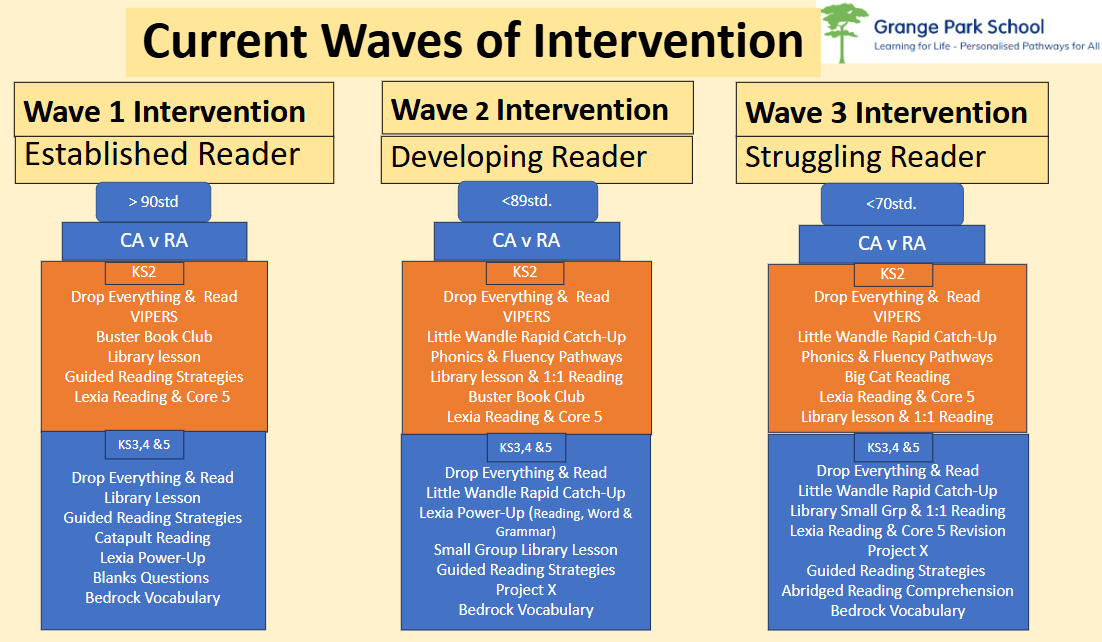Reading Interventions
Based on robust diagnostic assessment, we develop bespoke approaches to continually develop their confidence and enthusiasm for reading.
At Grange Park, all staff work alongside our Subject Leaders and drive the reading programme for children using a broad variety of effective up-to-date resources tailored to each student’s individual needs.
Waves
To ensure all pupils receive targeted interventions to boost their reading skills, they are assigned to a Wave based on their performance during diagnostic testing. Each Wave includes multiple strategies and bespoke programmes to address any barriers pupils may have to reading and build their confidence and self-esteem.


Strategies and Implementation
To implement our reading policy, Grange Park staff are trained and experienced in:
-
Phonics - The building blocks of successful reading involves matching the sounds of spoken English with individual letters or groups of letters. All children at Grange Park are supported with their phonics using Little Wandle Rapid Catch-Up. This structured, synthetic whole school phonics programme focuses on children not yet reading at the expected level for their age and yet to secure essential phonological awareness. Little Wandle Rapid Catch-Up ensures children build on their growing knowledge of the alphabetic code, mastering phonics to read and spell as they move through the school. When needed, bespoke phonics programmes are also championed to support pupils at Key Stage 3 and above. As part of CPD, staff are trained to deliver phonics. Pupils have access to decodable texts, texts to develop fluency, including access to the Collins eBook library.
-
Lexia Core5 – This software uses Lexia's research-proven model to provide an explicit, structured, systematic, and personalised learning approach to the five areas of reading: phonological awareness, phonics, fluency, vocabulary, and comprehension. Core5 also includes spelling and grammar (SPAG) practise and instruction.
-
Lexia PowerUp - This software targets secondary-aged pupils who need support with reading, academic vocabulary, and comprehension skills. To help them fully access and engage in the secondary curriculum, PowerUp literacy immerses students in an age-appropriate learning experience tailored to their individual strengths and weaknesses.
-
Bedrock – An online literacy programme that teaches vocabulary and grammar through reading a diverse range of high-quality texts.
-
Switch-on Reading (EEF Education Endowment Fund) is for children and young people between the ages 6-14 years working below age related expectations in reading and writing. This enables them to close the reading gap and participate more fully in the classroom, by becoming more confident and active, independent readers.
-
VIPERS (Vocabulary, Inference, Prediction, Explain, Retrieve, Summarise) - A reading and questioning technique to ensure pupils can engage fully with a range of texts.
-
Blank's Levels of Questioning - This is a bank of structured sets of questions, used to develop children’s understanding of what they are reading. Questions and prompts are levelled to the child and support their comprehension.
-
Attention Autism - Our SALT team support language development for less able pupils through developing focus and looking from left to right for information.
-
Big Cat Reading Scheme – These levelled books are written and developed by award-winning authors, supported by eye-catching illustrations and photography.
-
Word Up – A sight-word vocabulary intervention.
-
Blast (Boosting Language, Auditory Skills and Talking) – A sequential programme to support early learning skills.
-
Boardmaker 7 – Symbols-supported resources for printing visuals and learning support for use in class and learning environments.
-
ELKLAN Language Intervention – A programme of short, small group or individual sessions to improve children’s language and early literacy skills.
-
Guided Reading Strategies – sharing effective practice and research.
-
Wordless Books – develop imagination, interest in stories, enrich vocabulary, provide a child with opportunity to make up their own stories and heighten interest in reading.
-
Visuals – support reading through use of picture and symbols.
-
Storytelling – recognising the importance and value of regularly reading aloud to children of all ages.
-
Intensive Interaction – Guided by SALT, this is an approach to teaching communication skills for pupils still at early stages of development.
-
Talking Mats – promote language and communication to help pupils express their views.
-
Word games – including Wordle, Connections and Spelling Bee, used to promote vocabulary and communications among peers.
-
Libby/Harper Collins – eBook libraries
All staff share good practice and new initiatives/research through professional discussion, teamwork and a comprehensive CPD programme.
Meanwhile, our specialist Speech and Language Team (SALT) work alongside children, staff and parents/carers to support and develop social and language skills.
